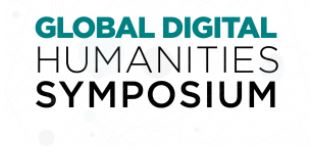Call for Proposals
Deadline: November 1
Proposal form
Digital Humanities at Michigan State University is proud to extend its symposium series on Global DH (msuglobaldh.org)
into its fifth year, on March 26-27, 2020. Digital humanities
scholarship continues to be driven
by work at the intersections of a range of distinct disciplines and an
ethical commitment to preserve and broaden access to cultural materials.
In celebration of the 10th anniversary of MSU’s Cultural Heritage
Informatics Program, we particularly encourage proposals along that theme, but as always we strive to showcase DH work in all its forms.
Alongside the expansion of digital humanities in under-resourced and
underrepresented areas, a number of complex issues surface, including,
among others, questions of ownership, cultural theft, virtual
exploitation, digital rights, endangered
data, and the digital divide. DH communities have raised and
responded to these issues, pushing the field forward. This symposium is
an opportunity to broaden the conversation about these issues.
Scholarship that works across borders with foci on transnational
partnerships and globally accessible data is especially welcome.
Additionally, we define the term “humanities” rather broadly to
incorporate the discussion of issues that encourage interdisciplinary
understanding of the humanities.
Focused on these issues of social justice, we invite work at the
intersections of critical DH; race and ethnicity; feminism,
intersectionality, and gender; and anti-colonial and postcolonial
frameworks to participate.
This symposium, which will include a mixture of presentation types,
welcomes 300-word proposals related to any of these issues, and
particularly on the following themes and topics by Friday, November 1,
midnight in your timezone:
• Critical cultural studies and analytics
• Cultural heritage in a range of contexts, particularly non-Western
• DH as socially engaged humanities and/or as a social movement
• Open data, open access, and data preservation as resistance, especially in a postcolonial context
• How identity categories, and their intersections, shape digital humanities work
• Global research dialogues and collaborations within the digital humanities community
• Indigeneity – anywhere in the world – and the digital
• Digital humanities, postcolonialism, and neocolonialism
• Global digital pedagogies
• Borders, migration, and/or diaspora and their connection to the digital
• Digital and global languages and literatures
• Digital humanities, the environment, and climate change
• Innovative and emergent technologies across institutions, languages, and economies
• Scholarly communication and knowledge production in a global context
• Surveillance and/or data privacy issues in a global context
• Productive failure
Presentation Formats:
• 5-minute lightning talk
• 15-minute presentation
• 90-minute workshop
• 90-minute panel
• Poster presentation
• There will be a limited number of slots available for 15-minute virtual presentations
Please note that we conduct a double-blind
review process, so please refrain from identifying your institution or
identity in your proposal.
Submit a proposal here
Notifications of acceptance will be given by December 9, 2019
Using Hypothesis for Annotating Readings
Hypothesis is a tool like Perusall that you can use for annotating websites. A recent blog post, “Comment, reply, repeat: Engaging students with social annotation,” by Alice Fleerackers, Juan Pablo Alperin, Esteban Morales, and Remi Kalir on their experiences is available here.
There is also a video presentation by Juan Pablo Alperin from a recent conference.
For Hypothesis see https://web.hypothes.is/

